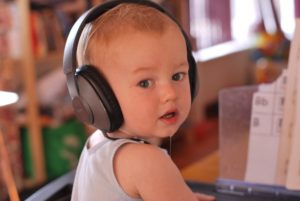Hearing is a major channel of communication for humans, and from the third month of pregnancy babies are already able to develop and perceive some sounds from outside the womb. After birth this development is daily and must be monitored and stimulated at all times.
When the baby is born, their auditory system is already ready, but their neurological system is not yet. This process will take some time to establish and mature, until the baby can show reactions to sounds and respond to calls by turning their face.
Stages of the Baby’s Hearing Development
The baby will develop their hearing ability according to their age group. Let’s look at what to expect for each age group:
- At three months – The baby wakes up upon hearing a loud noise and responds to the sound of a familiar voice.
- At six months – Reacts by moving their eyes, already responds and turns towards familiar voices.
- Between six months and one year – can pronounce a few simple syllables and tries to reproduce what they hear.
- Between one and two years – Can say some words and already interacts with adults. They learn to speak naturally, as they hear parents and friends.
The most critical period for a child regarding their auditory system is before the age of three. By this age hearing should be fully developed and have gone through all the stages according to expectations for that age group. That’s why it’s necessary and important for parents to pay attention and take their children for hearing tests if they notice anything out of the ordinary.
Each child develops at their own pace, but if something occurs outside the learning patterns due to the baby’s hearing, it is recommended to start treatment as soon as possible so that it does not interfere with school life.
Problems With Baby’s Hearing Development
One of the most serious problems that can impair a baby’s hearing is deafness. Out of every ten thousand newborns, thirty end up presenting hearing problems, and one of the causes is viral infections that occur during pregnancy. Rubella, for example, is a disease that causes hearing damage in babies, but it can be prevented with good guidance during prenatal care.
The newborn baby must undergo the newborn hearing screening before leaving the hospital. The evoked otoacoustic emissions test is completely free, as is the heel prick test. In this test, it is checked whether the baby responds to sound stimuli and whether more detailed exams are needed.
To carry out the hearing screening and check the baby’s hearing development, a small probe is inserted into the child’s ear and connected to a device. This device emits a sound that travels to the inner ear and returns to the device. When the sound does not return to the device, it means there is some problem with the baby’s hearing.
When the baby’s hearing development is compromised, parents should see an ENT specialist (otorhinolaryngologist) for further evaluation. It’s important to start treatment as soon as possible, so the baby’s language development is not impaired.
Often, it’s also necessary to have follow-up with a speech therapist to work on speech and hearing and achieve better treatment results. There are cases in which the child needs a hearing aid to improve hearing ability.
How to Stimulate Your Baby’s Hearing
It is very important for the baby to be stimulated to help with hearing development, and this action brings many benefits. But how can you stimulate your baby’s hearing?
Parents should talk to their baby and offer toys that make sounds. At this stage, babies try to repeat the words they hear, and parents can encourage repetition by speaking so the words are repeated.
Another way to stimulate hearing is to catch the baby’s attention with different sounds, different voices, songs, animal sounds, and children’s music. Remember that the baby hears from the womb, so it’s always good to let them hear your voice to soothe them.
Auditory stimulation should happen together with body movement, as this helps the baby to better retain the message. So, gesture and create a dialogue with questions. It’s important to maintain eye contact and speak slowly so the baby understands and starts to repeat the sounds they hear.
Of course, in the beginning you’ll get only some cries from your little one, then babbled words, and at a later stage, simple and short words. It’s important that when the child makes any sound, parents repeat what they heard. This way, they establish small dialogues that strengthen the bond between parents and baby.
Do Playful Activities Help Stimulate Baby’s Hearing?
Encouraging the baby through play is a big help for faster development. For this, take advantage of bath time, offer toys that grab their attention, and play with them at this moment.
Also, make sure to add games and other activities, with objects that make noise, such as rattles. At this time, the ideal thing is to observe whether the baby responds to sounds and different noises and how they react to each one.
It’s also important to repeat the same sound several times, so the baby starts to recognize what is being presented. In this process, visual stimuli can also be included, which help a lot in reinforcing and recognizing different types of noises.
See Also: Tests in Newborns After Birth
Photo: pxhere












